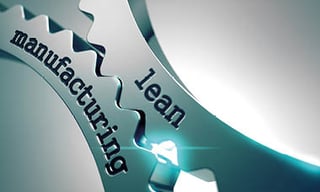 Lean manufacturing is the mantra for getting more out of less and, put simply, was a revolution when internationally recognised in the 1990s by Japanese car manufacturer, Toyota. The whole world witnessed the impact of the technique on the car company, which went from being a small local manufacturer to one of the largest car manufacturers in a short period of time. Since then, businesses around the world have learnt how the principles of the technique can be applied to their own businesses to improve their economies to scale. Here are the top ways lean manufacturing can eliminate waste and reduce production costs.
Lean manufacturing is the mantra for getting more out of less and, put simply, was a revolution when internationally recognised in the 1990s by Japanese car manufacturer, Toyota. The whole world witnessed the impact of the technique on the car company, which went from being a small local manufacturer to one of the largest car manufacturers in a short period of time. Since then, businesses around the world have learnt how the principles of the technique can be applied to their own businesses to improve their economies to scale. Here are the top ways lean manufacturing can eliminate waste and reduce production costs.
Improve quality of products
Good quality goods mean that you can meet your customer expectations easier. You may have the option of purchasing the parts for your products from a range of different suppliers: if you went for the cheapest, it could mean that your end product is of poorer quality. This would mean more complaints from customers, more time spent trying to rectify them, and more money spent on countering negative PR. Investing in good quality parts at the start may mean a higher initial outlay, but will result in fewer resources spent on quality control checks and rectifying bad situations – therefore the overall cost could also be less.
Reduce lead times
Lead times are gaps between each part of a process and are often the greatest areas for waste with a manufacturing business. Examples of lead time issues include the amount of time it takes to turn raw materials into your products, the amount of time it takes to roll out a marketing or PR campaign and the amount of time waiting for payments to clear. You can control these gaps and make your overall process time shorter by implementing process improvement.
Control inventory and overproduction
Inventory can be a huge waste for many manufacturing businesses – especially for products that expire. Any products that are not made parallel to actual customer orders could potentially turn into waste. To control this inventory, make sure production is produced based on raw sales figures, and ensure that your plant is producing only enough to meet short-term sales demand. As a general rule, your business should be producing the minimum to meet your customer demand.
Don't over-process
Over-processing is linked to lead times and should be kept to a minimum. Many companies use laborious and extensive checking systems to make sure errors are caught. However, these systems are often still error-prone, and can also mean that production is delayed and extra costs are incurred in these lengthy processes. Excessive paperwork and approvals are common examples of over-processing; unnecessary approvals can often add days – and even weeks – onto production times, often simply because of individual people letting work sit in their in-trays. Cut down unnecessary approvals, put more trust in your employees, and hold certain teams accountable for approvals to reduce wasted time.
Invest in an Enterprise Resource Planning (ERP) software system
In order to assist with the above, make sure you have the right technology in place to support lean processes; investing in an effective Enterprise Resource Planning (ERP) system with integrated production management software will help. ERP systems such as WinMan ERP can assist with tasks such as Kanban, reporting and making sense of disparate data. These types of systems can group a company’s data – which was once housed in many different electronic and manual systems – into one place so that it is simpler for staff to manage manufacturing processes, liaise effectively with customers and control inventory.



.png?width=120&height=120&name=MicrosoftTeams-image%20(4).png)


